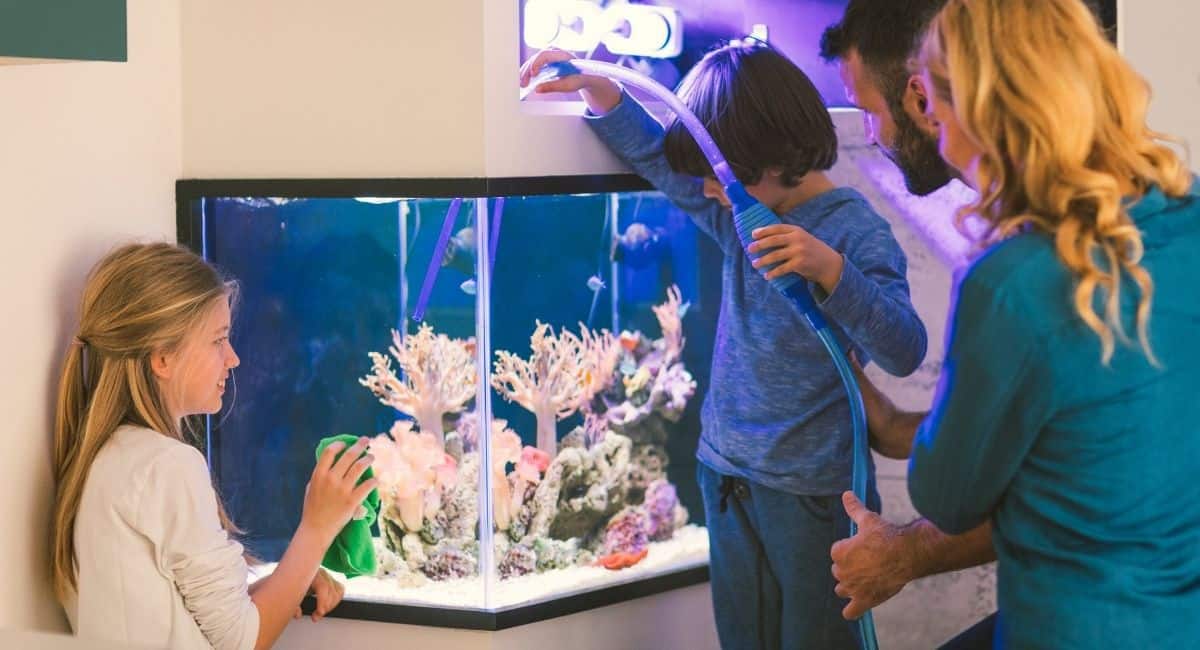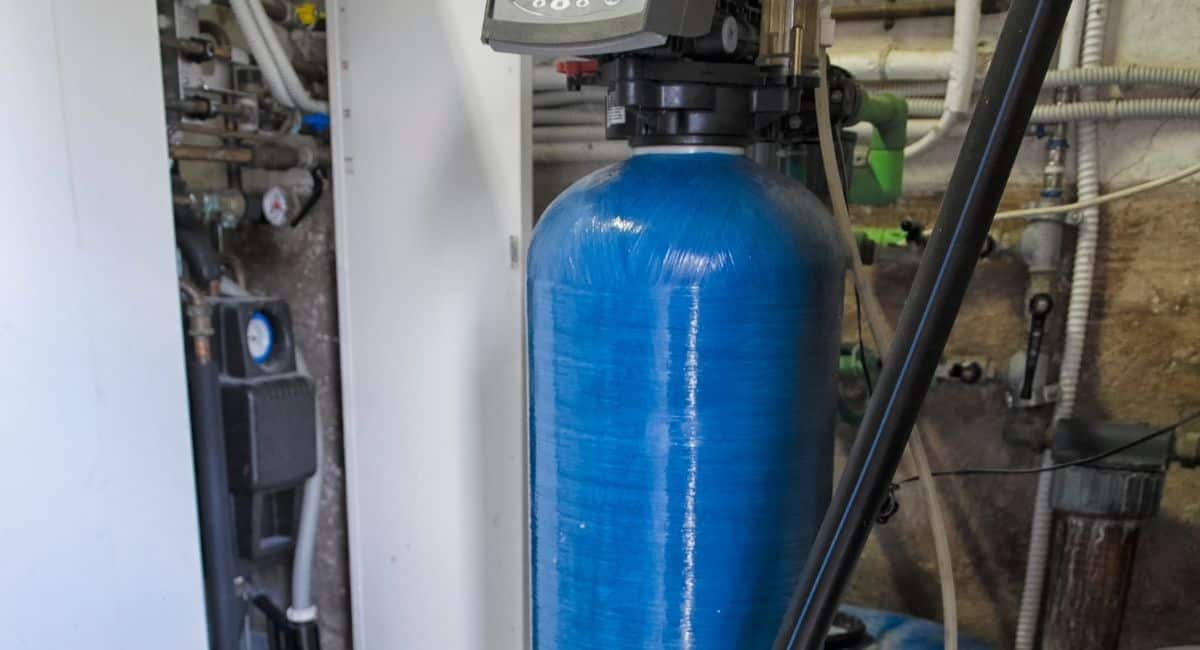We like to share product recommendations with you and hope you like them! Just to make you aware Water Filter Data may collect a small share of sales or other compensation from the links on this page.
If you’re like most homeowners, you probably think about water softening only when there’s a problem. Maybe you’ve started to see spots on your dishes, or your hair feels greasy and unmanageable. Or maybe the water just doesn’t seem to be as refreshing as it used to be. If any of these issues relate to you, it may be time to consider a home water softener.
In this blog post, we will discuss the benefits of water softening and how to choose the right system for your needs.
Should I Add Water Conditioner To My Fish Tank?
One of the most common questions we hear from fish owners is whether or not they should add a water conditioner to their tank. The answer, as with most things related to fish keeping, is ‘it depends.’
If your water has already low levels of hardness, then you may not need to add any additional water conditioner. If your water is hard or alkaline, adding a good quality conditioner can help reduce stress on your fish and improve their overall health.
The amount of water conditioner you’ll need to add will depend on the type and brand of conditioner you use. Most brands recommend using between .05 and .25 milliliters per gallon of water, with the lower end being best for new tanks, whereas higher amounts are necessary when your tank has been set up for some time.
If you’re setting up a new aquarium, it’s always best to use a tap water safe that has been treated with a conditioner before adding any fish or plants.
If you live in an area where the tap water is hard or alkaline, using a good quality conditioner will help ensure that your fish don’t suffer from stress due to poor conditions in their environment.
The purpose of the water conditioner is to remove chloramine from the water. Chloramine is a compound that consists of chlorine and ammonia, and it can be harmful to fish. A water conditioner will neutralize the effects of high levels of chloramine and make the water safer.

How Does Water Conditioner Affect Hardness?
Hardness refers to how much calcium and magnesium are in the water. The higher the concentration of these minerals, the harder your water will be.
How can we measure how hard or soft our water is? Water hardness is measured in milligrams per liter (mg/L), with “0” being the softest and anything above 200 mg/L being very hard.
The level at which you consider your home’s tap water “hard” depends on how sensitive you are to its effects! If you had ever used soap that didn’t lather well when off even though it was full, this might be due to how hard your water is.
Hard water can also leave spots on dishes and glasses after washing them with a dishwasher or hand soap if they’re not rinsed off thoroughly enough.
If you’ve experienced any of these issues in your home, then consider installing a water softening system. It’s easy to do it yourself and will help reduce how much cleaning you have to do around the house. There won’t be as many build-up deposits left behind from minerals like calcium carbonate.
Water Conditioner Systems and Their Use At Home
Water softener systems work by adding sodium ions to the water. This process causes the calcium and magnesium ions to bind with the sodium ions, reducing the overall hardness of the water. This is a desirable effect in most cases as it makes the water taste better and prevents build-up on appliances such as dishwashers and washing machines.
But how does this affect hardness?
The higher concentration of these minerals means that hardening will occur more quickly over time – because there are more particles for them to react with! If you notice any issues like spots left behind after using hand soap when cleaning dishes/glasses (even if they’ve been rinsed thoroughly), then consider installing a water softening system.

How Water Conditioner Affects Hardness
The first thing to do is remove calcium and magnesium ions from your tap water. These ions cause hardening when they react with other liquid chemicals such as soap, making it difficult for lathers or foam bubbles to form when washing dishes or glasses. This means less time spent cleaning up after ourselves!
Another way that a water conditioner affects hardness is when using sodium chloride or salt to soften hard tap water. This method involves adding a small amount (about one teaspoon per gallon) into your home’s plumbing system so it can be mixed with the incoming supply.
The level at which you consider your home’s tap water “hard” depends on how sensitive you are to its taste and odor. Some people may not notice any difference, while others might find an unpleasant aftertaste leftover from drinking it all day long. If this happens, there are several things you can do:
- Install a water softener in your home’s plumbing system so the minerals will bind together instead of reacting with soap or detergent molecules during washing.
- Use distilled vinegar instead of dish soap when washing dishes/glasses in the dishwasher without rinsing them beforehand – the acetic acidity helps prevent hardening from occurring.
- Try using bottled water that has been treated with reverse osmosis technology to remove impurities like calcium carbonate before consumption.
If all these options fail, consider switching over entirely by installing a new faucet filter for chemical filtration on your sink that will keep out contaminants but still allow the beneficial minerals back into your tap water.
How Much Conditioner To Use Per Gallon?
How much water conditioner to use per gallon depends on how hard your tap water is. The ideal level for most households would be around 15 grains per gallon, though some people prefer less or none! If it has a high concentration of minerals, such as calcium and magnesium ions, then you’ll need more than if there wasn’t so much in the first place (and vice versa).
If you are looking for an easy way to find out what type of softener system works best with your home’s needs, check out these steps:
- Run an empty load through one cycle using dish detergent directed on its packaging instructions but don’t rinse afterward. This will give an idea of whether or not any soap residue is left behind on dishes.
- Check the hardness level of your tap water by contacting your municipal water supplier or testing it yourself using a home water test kit.
- Compare the time you spend cleaning dishes/glasses without rinsing them beforehand when using dish detergent against how much time is needed when using distilled vinegar as directed. If there’s a significant difference, distilled vinegar might be better for removing soap scum residue.
- Run another empty load through one cycle using distilled vinegar instead of dish detergent and follow these same steps again.
If there’s no noticeable change in how long it takes to remove all traces of dirt, grime, or soap scum, then you might want to consider installing a new faucet filter on your sink. It will help keep out contaminants and restore the beneficial minerals to your tap water.
How Much Water Conditioner Is Too Much For My Fish Tank And Other Uses?
You should not add too much water conditioner.
Adding a little extra will help ensure that all of your appliances, including your fish tank, are getting the benefits they need to function properly and stay healthy. Most of the time, it’s recommended that you add more than the manufacturer recommends.
As for how much water conditioner to use per gallon specifically, just keep an eye on the hardness level of your tap water and adjust accordingly.
Conclusion
Water conditioners are a great way to keep your appliances – and fish tank – in good working condition by removing harmful minerals and preventing limescale build-up. Be sure to test the condition of your water before making any product purchases.
If you’re still unsure about which type of softener system would work best for your home, there are plenty of resources out there to help make the decision easier.
Happy conditioning!



